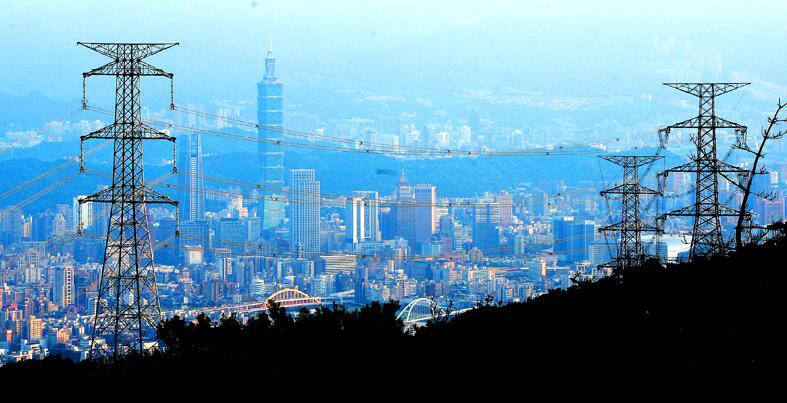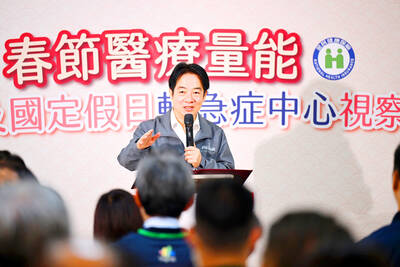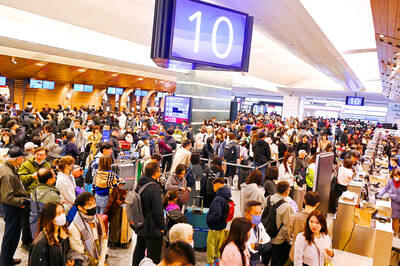The National Audit Office in its latest report on the central government’s fiscal accounts for last year called out four ministries for failing to adequately safeguard critical infrastructure.
The Ministry of Economic Affairs, the Ministry of Health and Welfare, the Ministry of Transportation and Communications, and the Financial Supervisory Commission failed to fulfill their responsibilities in this regard, the office said in its report.
The Ministry of Economic Affairs is required to protect critical infrastructure for the subdomains of electricity, petroleum, natural gas, water supply, maritime transportation, software parks and industrial zones, the report said.

Photo: Lin Cheng-kun, Taipei Times
In addition, the ministry is responsible for inventorying key assets and facilities under its jurisdiction, compiling lists of potential critical infrastructure and ensuring facility operators complete self-assessment surveys regarding critical infrastructure, it said.
After compiling the completed surveys, the authorities must complete a preliminary assessment and submit it to the Homeland Security Office for further review and approval, the report said.
However, the ministry’s resilience plans for the four subdomains of electricity, petroleum, natural gas and water supply lack appropriate risk assessments and clearly prioritized security protection measures, it added.
Furthermore, during last year’s critical infrastructure review process, some subdomains failed to compile lists of potential critical infrastructure, the report said.
Instead, facility providers independently determined whether infrastructure met criteria, raising concerns that some critical infrastructure was overlooked, it said.
The office said it formally requested the Ministry of Economic Affairs to make improvements.
The report also said that the Ministry of Health and Welfare had not done enough to protect the infrastructure under its jurisdiction.
The ministry has not set up a coordination team with other related agencies or created an adequate security plan, which could weaken the safety of critical systems like hospitals and emergency services, the report said.
The report emphasized that a recent wave of ransomware attacks on hospitals poses a serious threat to Taiwan’s critical infrastructure.
To ensure that medical services remain uninterrupted during emergencies, the Ministry of Health and Welfare has been formally requested to cooperate with the Homeland Security Office’s policy planning, the National Audit Office said.
This includes strengthening emergency preparedness in healthcare sectors through resource stockpiling, regular drills and cross-sector collaboration, it said.
The report had two main criticisms for the Ministry of Transportation and Communications:
First, the ministry has yet to adequately facilitate coordination between agencies from transportation sector subdomains or establish mechanisms for resource and information sharing, the report said.
Second, security protection plans for the transportation sector and several of its subdomains took six years to complete, or in some cases, have yet to be developed, it said, calling on the ministry to improve its security plans.
The report also said that while the Financial Supervisory Commission has cooperated with the Homeland Security Office to strengthen overall protection of the critical infrastructure under its jurisdiction, it has not fully carried out its duties as the coordinating agency for the financial sector.

NON-NEGOTIABLE: The US president’s action ran counter to one of the US’ ‘six assurances’ on not consulting China about arms sales to Taiwan, US lawmakers said US President Donald Trump’s admission that he is discussing arms sales to Taiwan with Chinese President Xi Jinping (習近平) is “alarming and a blatant violation of US policy and the six assurances,” US Representative Ro Khanna said on Tuesday. Trump on Monday said he would decide soon on whether to send more weapons to Taiwan, after Xi warned him not to do so. “I’m talking to him about it. We had a good conversation, and we’ll make a determination pretty soon,” Trump told reporters aboard Air Force One when asked about warnings raised by Beijing during a phone call with Xi over

REAL EMERGENCIES: To avoid overcrowding, the health minister urged people with mild or moderate symptoms to go to UCCs, while the ER should be for critical cases President William Lai (賴清德) yesterday inspected the nation’s Lunar New Year medical preparedness with a visit to an urgent care center (UCC) in Taipei and expressed confidence in the Ministry of Health and Welfare’s plans to prevent emergency room (ER) overcrowding during the nine-day holiday. The ministry in November last year launched a pilot UCC program to provide urgent medical care at 13 clinics in the nation’s six special municipalities over weekends and on holidays, aimed at relieving pressure on crowded ERs. To ease ER overcrowding during the Lunar New Year, when most hospitals and primary care clinics are closed, the National

VACILLATING? Some US officials are concerned that Trump’s April visit to Beijing might be affected if Washington pushes through additional weapons sales to Taiwan A major US arms sales package for Taiwan is in limbo following pressure from Chinese President Xi Jinping (習近平) and concerns among some US officials that greenlighting the deal would derail US President Donald Trump’s upcoming visit to Bejing, the Wall Street Journal (WSJ) reported on Wednesday. Trump on Monday said that he would decide soon on whether to send more weapons to Taiwan, after Xi warned him not to do so. “I’m talking to him about it. We had a good conversation, and we’ll make a determination pretty soon,” Trump told reporters aboard Air Force One when asked about warnings raised

HOLIDAY RUSH: Airport passenger volume is expected to reach a new high, while southbound road traffic would likely peak from Tuesday As Lunar New Year travelers flock overseas, passenger traffic at Taiwan Taoyuan International Airport is expected to shatter records, as Taoyuan International Airport Corp (TIAC, 桃園國際機場), Taiwan’s largest aviation hub operator, projected yesterday’s passenger volume to climb to 167,000. The figure comes after a record single-day high of 161,000 passengers on Thursday, and would surpass the previous pre-COVID-19 pandemic Lunar New Year peak of 166,000 passengers in 2019, TIAC said. Long lines could be seen forming as early as 7am yesterday, filling Terminal 1 of the airport almost to capacity, yet security checks took only 10 to 15 minutes. TIAC urged